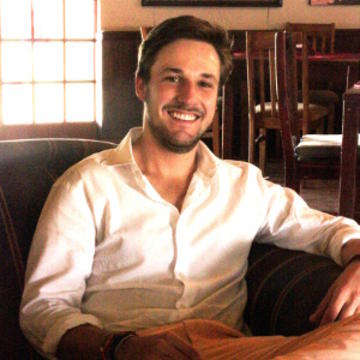Matthew de la Hey, co-founder and CEO of inploi

Matthew is co-founder & CEO of inploi, the professional platform for the New Collar workforce. inploi connects employers with Millennial and Gen-Z job seekers – the New Collar workforce – giving them tools to connect and communicate. With employer brand development at its heart, inploi empowers companies to speak to workers as consumers of workplaces, helping them to tell their stories with captivating videos, images, and written content in order to engage active and candidates.
When actively hiring, inploi’s software is a powerful recruitment marketing tool incorporating job post creation and distribution, applicant tracking, CV-parsing, candidate-job matching, proactive talent search, video profiles, instant messaging, video calling, file sharing, programmatic job advertising and more. Delivering a best-in-class user experience, inploi is accessible via the web and iOS or Android mobile applications, meaning companies and candidates can easily connect and communicate, however they access the internet.
Based in London, with operations expanding internationally, inploi has raised over £1m to develop and test their software and have grown to a team of 7 people. Matthew was a Weidenfeld Scholar at Oxford, and a member of New College. He read an MSc in African Studies and an MBA, on the 1+1 programme.

I grew up in the countryside of KwaZulu-Natal, South Africa on a dairy farm. As an undergraduate I studied Accountancy & Finance at Stellenbosch University because I had my eye on running a JSE 40 company one day, and in a very vocational academic environment becoming a Chartered Accountant was a well-trodden path to getting there. I was en route to qualifying (and had written all but one of the professional examinations) but before starting as an articled clerk I won a scholarship to Oxford, and my path changed. I had applied to do an MSc in African Studies, because I wanted to better understand the continent I came from, and particularly its socio-political-historic contexts before doing business across it. I also really wanted to study something in the social sciences, after a few years of audit, accounting, tax and law! I loved the MSc and applied to stay on and transfer to the business school, where I did the MBA. During this time I’d done stints of work at the World Bank in Washington, an emerging markets hedge fund, and finally at an Africa-focussed private equity fund. It got to a point however where I’d been working on inploi for a while on the side and I had to decide whether to dive into building a ‘corporate’ career or a business – the latter won.
Entrepreneurship is the pursuit of (financial) opportunity through creation.
In the summer between my years at Oxford I’d looked for work as a waiter and experienced first-hand how extraordinarily bad existing ‘solutions’ were. This planted a seed that grew through discussions with my co-founder (Alex Hanson-Smith) who had had similar experiences, leading to a period of market research: surveys, potential-user interviews, competitor analysis, market-sizing, etc, seeking to determine whether there was in fact a real (and sizeable) problem to be addressed / opportunity to be grasped. Once we were convinced of the opportunity, had enough evidence to present a business case, and were more certain that we could solve a massive inefficiency with technology, we quit our jobs and took the plunge!
The ability to deal with uncertainty; being able make decisions quickly; a high tolerance of failure. Setting out to create a company is incredibly hard work. You need to be a harder worker than just about anyone you know. One wears many hats and juggles an immense number of responsibilities, learning and executing as you go. You’re perpetually trying to get from point A to point B as quickly and cheaply as possible, with point C and how to get there knocking at the back of your mind. There are many failures, big and small, which you need to be able to digest, learn from, and keep moving forward. You deal with a huge amount of uncertainty on a daily basis, and face a vast array of questions – which markets should we enter? How best do we reach them? Will we be able to raise the funding we need? Will we be able to achieve the traction to do so? What if we lose our investor’s money? How will our competitors react to us? What about new entrants? How can we best spend limited budget? Etc. etc. etc.!
The sense that we are creating something; that we’re spending our time building something potentially bigger than ourselves, which may impact (and hopefully improve) the world in some small (or big) way. The freedom to explore and implement ideas. The ability to make decisions and move on them quickly. The challenges of ongoing problem solving. Working with smart people in an informal and creative environment.
Tough question! I am constantly inspired and driven to achieve more by so many people – Thuli Madonsela, South Africa’s courageous ex-public protector for fearlessly standing up for what is right; Patagonia for its stakeholder capitalism; Haruki Murakami for his simple yet profound narration of the lived experience.
Their top 10 book recommendations, and why.
Watching the first people interact with a platform we’d built from scratch, speaking to each other, and finding employment.
I think I’ve learned to be less hard on myself. We’ve made various boring mistakes along the way and have failed at various things from sales meetings to investment discussions. Pick yourself up, dust yourself off, and get back in the saddle.
We have funded inploi’s development through investment from a mix of friends, family, business associates, and venture capital funds. The UK government’s Research and Development grants have also been a great help. We’ve presented inploi at Stanford University as part of the US State Department’s Global Economic Summit, in Beijing at Peking University’s Global Youth Entrepreneurship Summit, and have won a few awards including Springboard’s Best Use of Social Media to Attract Talent and the Best Newcomer at the Global Recruiter awards, and finally we were selected as one of the UK’s Top 100 start-ups in 2019, and as one of the Top 50 most influential brands in our sector, according to Brand Weekly.
I am currently based in London, but I think Oxford(shire) is a pretty good place to be, particularly due to the resources available via the city’s Universities, the talent they produce, their entrepreneurship centres and clubs, an endless stream of inspirational speakers and talks, and a number of regional funding opportunities. Depending on what one is doing, on the downside it is a pretty small market and some distance from many of the key decision makers one will likely need to interact with. However with the move to online meetings, this is becoming a lot less of an issue!
If they were Oxford-based, then the Entrepreneurship Centre at the Saïd Business School/ The Oxford Foundry. There are also a huge amount of useful online resources – for tech startups Angel List’s Venture Hacks Bible is pretty good. Y- Combinator has also recently published a library of their startup reading. Finally I’d say don’t under-estimate people’s willingness to help – but remember when they do, and pay it forward when someone needs it from you!
With apologies to Dickens, I’ve found entrepreneurship to be a lot like this extract from A Tale of Two Cities (which I have not actually read!): “It was the best of times, it was the worst of times, it was the age of wisdom, it was the age of foolishness, it was the epoch of belief, it was the epoch of incredulity, it was the season of Light, it was the season of Darkness, it was the spring of hope, it was the winter of despair, we had everything before us, we had nothing before us, we were all going direct to Heaven, we were all going direct the other way…”
Share this
More news



